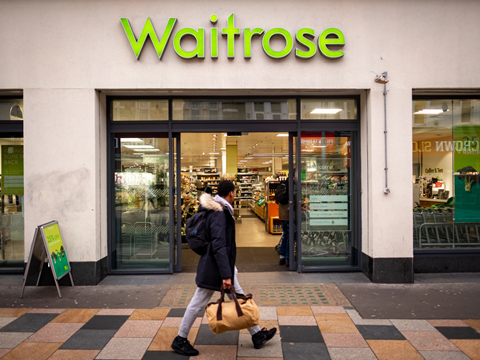
Waitrose has become the newest member of Polytag’s Ecotrace Programme, which identifies and captures data on single-use plastic packaging throughout the recycling stream using invisible UV Tag technology.
Launched in the summer of 2024, the programme intends to improve the efficiency and accuracy of plastic recycling using invisible UV tag detection technology. Several ‘strategically located’ material recovery facilities (MRFs) have retrofitted Polytag’s Plastic Detection Units – which identify UV Tags printed on plastic packaging in invisible, fluorescent ink – to their conveyors.
The move is expected to bolster the accuracy and efficiency of their recycling processes while enabling brands to quantify how much of their post-consumer packaging has been recycled. As an Ecotrace member, Waitrose can now access the Polytag dashboard, an online hub of live, barcode-level data tracking plastic packaging materials through the recycling stream.
This information is expected to be beneficial as Extended Producer Responsibility (EPR) legislation comes into force, holding brands and retailers responsible for the disposal of their packaging materials.
Soon twelve Plastic Detection Units will have been installed at MRFs across the UK; this is set to offer even more data on single-use plastic packaging and improve the UK’s recycling rate.
“Waitrose joins us at a pivotal moment as we approach our goal of installing PDUs at 12 sites within the first year of our Ecotrace Programme,” explained Alice Rackley, CEO of Polytag. “This is an incredible achievement that will empower FMCG brands, retailers and waste management companies by providing invaluable access to granular barcode-level data on 50% of the UK’s waste recycling stream.
“This wouldn’t be possible without the support of partners like Waitrose, who share our vision for transforming the way plastic waste is tracked and recycled. Their participation marks a major milestone for us, and we’re incredibly proud to be working together to drive meaningful change in recycling rates and bring the industry together to revolutionize data capture and how we interact with single-use plastic.
“We would also love to hear from other industry leaders that are interested in joining the Programme to work towards a more circular economy.”
Denise Mathieson, head of Packaging Design & Delivery at Waitrose, added: “At Waitrose, we are committed to reducing our impact on the environment and finding innovative solutions to improve the recyclability of our packaging. Joining Polytag’s Ecotrace Programme is a significant step forward in enhancing our ability to track and understand the journey of our plastic packaging post-consumption.
“By leveraging Polytag’s technology, we will gain unprecedented insights into how our packaging is recycled, allowing us to make more informed decisions that support a circular economy. This initiative aligns with our ongoing sustainability efforts and reinforces our dedication to reducing single-use plastic waste.
“We are excited to collaborate with Polytag and other retailers to drive meaningful change at an industry level, ultimately contributing to a more transparent and effective recycling system in the UK.”
In a recent announcement, Polytag shared that it had installed MRFs at its Conwy, Gwynedd, Pembrokeshire, and Anglesey sites, all in Wales. In doing so, it claims to have facilitated real-time traceability for 146,000 tonnes of plastic packaging waste, and expects to increase recycling efficiency across participating MRFs, which are currently said to reach an average recycling rate of 66.5%.
Other sustainability-minded packaging developments from Waitrose include launching a recycling scheme for natural cork, an effort hoped to keep 25 million corks out of landfill annually; and its adoption of Greiner Packaging’s self-separating packaging solution, which claims to achieve a recycling rate of up to 98%, for its own-brand instant porridge pots.
If you liked this story, you might also enjoy:
Reuse vs. single use – which is better for the environment?
Sustainable Innovation Report 2025: Current trends and future priorities
What can the world learn from South Korea’s world-leading performance in plastics circularity?














No comments yet